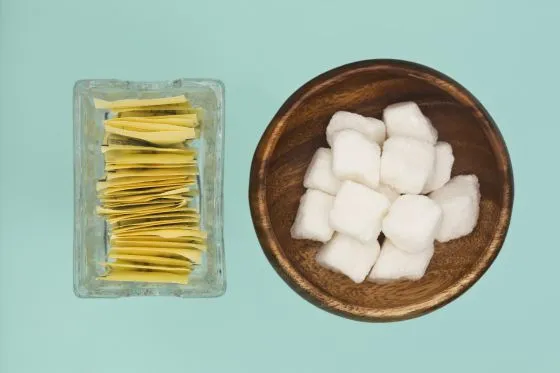Let's be sincere: We like sweet drinks more.Whether cold or hot, juices or coffees, soft drinks or infusions."The sugary flavor is pleasant for the human palate, and a way of alleviating situations of stress or discouragement, for the pleasure it generates," says the dietitian-nutritionist Nuria Guillén.Then, often and for the bad reputation of sugar, we turn to sweetened versions.Almost the same flavor and less calories."The sugar has four calories per gram and the artificial sweeteners none," says Alba Andreu, dietitian and nutritionist at the Clinic Hospital in Barcelona.It is true, but also that recent investigations suggest that, when asking for drinking drinks, you are doing a skinny favor to your diet, microbiome (set of microorganisms) of your stomach and, incidentally, feeding your possibilities ofDevelop obesity and diabetes.
While obesity reaches proportions of epidemic in many parts of the planet, it is known that its solution is, simply and plainly, weight control."When one wants to lose weight what is advised is caloric restriction, minor intakes to which they are usually consumed and increased physical activity," Andreu recommends.According to the dietitian, water consumption should never be replaced by sweetened beverages and, without a doubt, ”when there are obesity and diabetes problems, the consumption of artificial sweeteners on sugar must be prevail,” he says.
Alberto Lana, a researcher at the Faculty of Medicine and Health Sciences of the University of Oviedo and also belonging to the Autonomous University of Madrid, is the first author of an article that associates the consumption of sucrose drinks with obesity biomarkers and diabetesType 2. "It is a controversial issue, but independent research has shown that the consumption of sugary soft drinks, by pure logic, increases the risk of obesity, overweight and type 2 diabetes and, therefore, probably, of any heart disease"Explains Lana.In this study, the scientist and his colleagues observed how the intake of these juices (soft drinks and juices) increased insulin levels (the hormone that regulates the collection of blood glucose) and leptin (which regulates appetite, betweenother functions), both associated with obesity.First resolved dilemma: in matters of overweight, much better synthetic substance.
The dark side of the artificial sweetener
Last fall, the prestigious Nature magazine published a study with at least unexpected results.Researchers at the Weizmann Institute of Recoovot (Israel) demonstrated in mice that three artificial sweeteners, used in a regular basis in drinks and food (saccharin, aspartam, a first step in the development of obesity and diabetes.
This same investigation also contributed overwhelming, and at the same time debatable indications, that the same can be happening in humans."The artificial sweeteners were introduced into our diet with the intention of reducing calorie intake and normalizing blood glucose levels without the 'sweet' taste being compromised," written scientists in their article: "Our results suggest thatArtificial sweeteners may contribute directly to the epidemic against which they should deal in theory. ”
The article is not free of controversy or criticism, many of them on the conclusions in humans, which contradict other studies.For example, in this work of Nature 381 non -diabetic individuals were analyzed and the scientists found a correlation between the consumption of light beverages and an increase in the weight of these people.This relationship tooIt was demonstrated in a study with 66,118 French.On the other hand, another scientific work, with thousands of participants, found no link between Light and overweight.Nor prepared by Alberto Lana.A product is considered Light, according to European regulations, when it has a non -light counterpart in the market and a reduction of 30% or more of some of its nutrients.In the case of sugary drinks, this is achieved with non -caloric sweeteners, such as saccharin.
So what were we?
On the one hand, studies are not exactly the same and have methodological differences that make the results different.On the other, the investigations that have such number of people, the epidemiological ones, demonstrate association but not necessarily a causal relationship between two facts.
In his office of the Clinic Hospital, Alba Andreu emphasizes that in obesity there are many factors at stake and that a study will hardly contemplate them.“That a work associates the consumption of sweetened beverages with a weight gain has many possible explanations.For example, it may be that people who take this type of drinks already have a departure overweight, or also that they follow very unbalanced and fat -rich diets and opt for saccharin to compensate, ”says Andreu.That raising the hand who has not asked for a coffee, "with saccharin, please", after a greasy binge.
Anyway, research on Light products have done little more than start.We will see what science holds us."The study of whether sweetened drinks, such as sugary, are associated with obesity and diabetes is still in very preliminary phases," concludes Alberto Lana. Meanwhile, we have the recommendation of the WHO, which suggests not exceeding 25 grams ofSugar per day (an individual industrial orange juice container, for example, has 11.2 grams).of a person of 70 kilograms is 1,050 milligrams;



